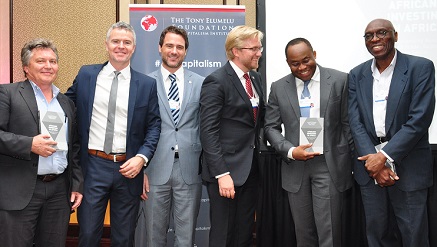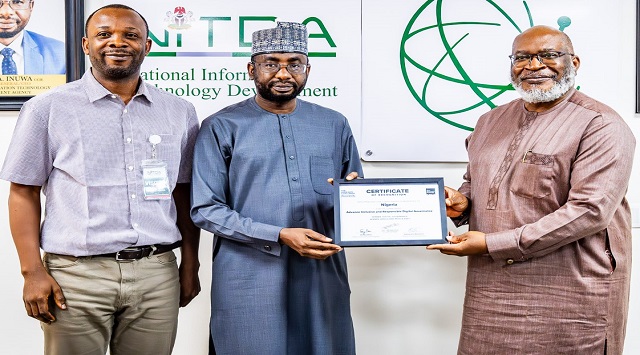News
Africans Investing in Africa” Book Launch

Two of Africa’s most prominent foundations – the Nigeria-based Tony Elumelu Foundation and the Oppenheimer family’s Brenthurst Foundation of South Africa – launched an important new book titled “Africans Investing in Africa” on the sidelines of the World Economic Forum Africa meeting in Cape Town.
The 338-page book covers a range of important topics critical to Africa’s development. It provides a unique perspective of how Africans are leading the way through intra-African trade and investment, documenting how, where and why Africans invest across the continent.
The book also identifies the economic, political and social experiences that hinder or stimulate investment, and highlights examples of pan-African companies and investors.
This book is the outcome of a project conceived in 2011 by the two foundations, and builds on a paper published by their respective principals – Tony O. Elumelu, CON, and Jonathan Oppenheimer – in which they first explored the depth and breadth with which African companies were expanding across the continent and contributing to Africa’s growth.
The foundations, have established records of scholarship and policy advice on issues impacting Africa’s economic growth and development.
Together, they conducted in-depth, case study-based research into why many African-owned and/or African-based companies were still struggling to succeed across multiple geographies on the continent, despite Africa’s impressive economic growth rates and overall improvements in macro-economic management.
“Through my experience as CEO of the United Bank for Africa, I worked hard to expand UBA from a Nigerian bank to one that now has subsidiaries in 18 additional African countries,” said Mr. Elumelu, now Chairman of the bank.
“This experience showed me the commercial benefit of investing across Africa as well as the broader economic and even social impact the private sector can make, which was the origins of the philosophy I call ‘Africapitalism’.”
The book has sixteen different contributors hailing from respected universities and research institutions in Africa, Europe and North America; all with deep knowledge of and experience in Africa.
One of the contributors, Professor Sir Paul Collier of Oxford University, writes in the book’s introduction that “this is a timely book….Africa’s economies have huge potential for growth that is more widely diffused across many sectors.
Despite softer commodity prices, during the coming decade Africa will continue to catch up with the world economy.”
Covering sectors from transport infrastructure to information communication technology to private security to cement manufacturing, the book analyzes some of the leading pan-African companies to illustrate both the challenges and opportunities of intra-African trade and investment.
Jackie Chimhanzi, who works with the Industrial Development Corporation of South Africa, writes about regional economic communities and their role in facilitating more cross-border business.
Entrepreneurship expert Eric Kacou of Cote d’Ivoire covered Africa’s media and entertainment industry, highlighting emerging value chains and stalwarts like Nation Media Group of East Africa.
And Bitange Ndemo, former Permanent Secretary of Kenya’s Ministry of Information and Communications writes about how technology is facilitating more business, trade and investment between countries.
Speakers and attendees from the WEF Africa meeting were on hand to listen in on the presentations provided by the book’s editors: Dr. Wiebe Boer, Director of Strategy at Heirs Holdings and former CEO of the Tony Elumelu Foundation; Dr. Terence McNamee, Deputy Director of the Brenthurst Foundation; and Mark Pearson, an economist and expert in African affairs.
News
NITDA Partners OGP to Drive Presidential Digital Goals

The Director General of the National Information Technology Development Agency (NITDA), Kashifu Inuwa, CCIE, has reaffirmed Nigeria’s commitment to open governance, transparency and inclusive digital development as the Open Government Partnership (OGP) team formally presented the award and certificate received at the OGP Global Summit Spain 2025 to the Agency’s leadership.

Nigeria emerged as the overall global winner in the Digital Governance category in recognition of the country’s excellence in deploying digital tools and policies to strengthen government transparency, accountability, and citizen engagement. In addition, Nigeria received the Regional Award for advancing Open Digital Governance across Africa and the Middle East, reaffirming its leadership role in promoting open government principles and driving digital transformation across the region.
These recognitions were largely attributed to initiatives led by NITDA in collaboration with civil society partners, such as Dataphyte, which showcased innovative and inclusive approaches to digital governance at the summit.
The summit, which was organised in Vitoria-Gasteiz, Spain, brought together more than 1,500 high-level representatives of governments, civil society leaders, and policymakers from around the world to exchange experiences, best practices, and progress on open government initiatives and implementation on key issues.
Receiving the OGP delegation at NITDA, Inuwa described the recognition as a national honour rather than an institutional one, stressing that the award reflects Nigeria’s collective efforts across government, civil society and the private sector in advancing open governance principles through the digital space.
According to him, such global recognition comes with heightened responsibility to deliver on commitments made under the OGP framework.
“This is not just about NITDA. It is a national recognition, and every recognition comes with responsibility,” the DG said.
“If we fail to execute the commitments we have made, it will not only affect our image locally but also at the international stage. This is also not something NITDA can do in isolation,” he added.
Inuwa linked the achievement directly to the Renewed Hope Agenda of President Bola Ahmed Tinubu, noting that digital transformation, transparency, economic diversification, job creation and efficient public service delivery remain central presidential priority areas.
He emphasised that leveraging digital technologies to deepen openness and accountability aligns with national objectives of strengthening institutions, improving governance outcomes and building trust between government and citizens.
Highlighting the importance of collaboration, the NITDA boss underscored the role of the OGP platform as a catalyst for a strong multi-stakeholder approach in Nigeria’s digital ecosystem.
He called on civil society organisations, development partners, the private sector and other government institutions to provide technical expertise, guidance and sustained engagement to ensure effective implementation of agreed commitments.
“We need to leverage the OGP platform. We need your expertise, your guidance, your support and your commitment to hand-hold us in delivering on these commitments,” he said.
He further noted that “a multi-stakeholder approach in the digital space is critical to fostering a resilient ecosystem that delivers real value to citizens.”
Inuwa disclosed that NITDA has already begun internal reviews of its OGP commitments and has tasked its representatives, including Dr Rousseau, to work with colleagues to develop a clear execution strategy.
He proposed the creation of joint work streams with OGP stakeholders to support implementation, ensure accountability and keep all parties on track.
“We are humans. Oversight and collaboration help us stay focused. With commitment, nothing is impossible, and I believe these goals are achievable,” he added, assuring the delegation of NITDA’s readiness and political will to deliver on all agreed commitments.
Inuwa also welcomed the idea of engaging the political leadership of OGP, including the Honourable Minister of Budget and Economic Planning, with a view to briefing President Tinubu on the achievement. He noted that celebrating milestones is important, as it reinforces morale and demonstrates that Nigeria’s efforts in digital governance are gaining global recognition.
“It’s also good when there are wins, we should celebrate, because we too never knew that the little things we are doing are noticed not just within Nigeria, but globally, to the extent of earning us this award,” he asserted.
He concluded by expressing gratitude to the Nigerian National OGP Secretariat and the global OGP leadership, reaffirming NITDA’s commitment to strengthening collaboration and building a more productive working relationship that will translate open governance principles into measurable national impact.
Earlier in his remark, Mr Olusoji Apampa, who led the OGP deelegation, said the honours were earned through a strong partnership between government and civil society, with NITDA playing a critical role, particularly in commitments focused on improving digital governance in Nigeria.
Apampa expressed hope that the awards would serve as added momentum to deepen ongoing commitments under NITDA’s leadership and accelerate the practical implementation of reforms aimed at strengthening digital governance across the country.
News
PalmPay Launches N400 Million World Travel Carnival, Rewarding Users with Free Global Trips

PalmPay, Nigeria’s leading digital banking platform, has announced the launch of its ₦400 million festive rewards campaign, designed to reward users with cash prizes and fully sponsored international travel experiences for everyday transactions on the PalmPay app.

The campaign will run from December 17, 2025, to January 8, 2026. The campaign is designed to reward everyday transactions with extraordinary experiences. It runs alongside PalmPay’s Purple December brand campaign, which focuses on wrapping up the company’s key brand and community initiatives for the year.
At the centre of the rewards campaign is the PalmPay World Travel Carnival, an interactive card collection experience that allows users to earn city cards by completing transactions on the app. Users are required to collect five city cards – London, New York, Dubai, Sydney, and Cape Town and combine them into a World Card, which unlocks a share of the prize pool.
The more World Cards a user creates, the larger their share of the cash rewards. Any extra uncombined cards can be swapped with friends and other PalmPay users to help complete additional World Cards.
Beyond cash rewards, the Carnival also offers Free Global Trips. In each round, the top two users with the highest number of eligible transactions (₦100 and above) and at least one World Card will win an all-expense-paid international trip.
The travel grand prize covers:
- Visa fees
- Round-trip international airfare
- 5-day, 4-night hotel accommodation
- Side attraction
- Meal expenses
- Airport pick-up and drop-off
- All transportation for scheduled tour activities during the trip
Winners will be determined through a transparent leaderboard system, with prizes credited automatically at the end of each round on December 25, December 31, and January 8.
Participation is simple:
- Complete tasks on the PalmPay app, such as Airtime, Data, Transfers, and other specific transactions listed in the app, to earn cards.
- Collect all five city cards.
- Swap cards with friends to complete your collection.
- Combine cards to form a World Card and earn cash rewards.
- Perform more transactions to climb the leaderboard for a chance at the global trip prize.
To ensure fairness, PalmPay has instituted strict rules: no cheating, bots, fake accounts, or manipulation. Any violations may lead to disqualification or account bans. Additionally, the Free Travel Prize is limited to one per user throughout the campaign.
Speaking on the launch, Femi Hanson, Head of Marketing & Communication, “This festive rewards campaign is about turning everyday banking into meaningful value for our users. With the World Travel Carnival as the headline activation, we are reinforcing PalmPay’s promise of being the smarter way to bank—where smart financial decisions unlock bigger opportunities.”
News
REA, NBS Partner to Deliver Comprehensive Energy Data for Nigeria

The Rural Electrification Agency (REA) and the National Bureau of Statistics (NBS) have signed a Memorandum of Understanding (MoU) to conduct a nationwide energy survey aimed at closing long-standing data gaps in Nigeria’s power sector. The initiative is expected to guide policy, attract investment, and accelerate universal electricity access.

Signed in Abuja, the agreement establishes a National Energy Survey based on the Multi-Tier Tracking Framework (MTF), a globally recognized methodology that measures electricity access not only by grid connection but also by quality, affordability, reliability, and usage of electricity and clean cooking solutions.
The survey will be implemented under the Energy Sector Management Assistance Program (ESMAP) of the World Bank. Dr. Abba Aliyu, REA Managing Director/CEO, said the partnership underscores REA’s commitment to evidence-based rural electrification planning and will generate detailed insights on electricity access and off-grid solutions nationwide.
Prince Adeyemi Adeniran, Statistician-General of the Federation/CEO of NBS, emphasized that reliable statistics are essential for effective policymaking, assuring that NBS will provide technical oversight, sampling expertise, and quality assurance to meet global standards.
The survey will assess energy access, household affordability, expenditure patterns, and the adoption of off-grid technologies such as solar home systems, mini-grids, and clean cooking solutions. REA will provide sector expertise and policy alignment, while NBS manages regulatory approvals, methodology, and technical supervision.
Funded and technically overseen by the World Bank, the exercise will run for 18 months, with the resulting data expected to improve national energy planning, programme targeting, and private sector investment, particularly in underserved and rural communities.
Officials said the collaboration reflects the Federal Government’s commitment to strengthening inter-agency coordination, enhancing energy data availability, and advancing Nigeria’s goal of universal electricity and clean cooking access.

 Telecom3 days ago
Telecom3 days agoAirtel Africa Partners Starlink to Launch Direct-to-cell Service in 14 Markets

 E-Business3 days ago
E-Business3 days agoCheck Point Reveals Nigeria as Second Most Targeted African Country for Cyberattacks in November

 News3 days ago
News3 days agoREA, NBS Partner to Deliver Comprehensive Energy Data for Nigeria

 E-Financial3 days ago
E-Financial3 days agoCBN Revokes Licenses of Two Mortgage Banks, NDIC Begins Liquidation

 E-Financial3 days ago
E-Financial3 days agoCBN Revokes Licences of Aso, Union Homes Mortgage Banks Over Regulatory Breaches

 General News2 days ago
General News2 days agoFirstCap Acts as Joint Issuing House on Veritasi Homes & Properties Plc’s ₦30 Billion Bond Programme

 E-Business3 days ago
E-Business3 days agoMicrosoft Empowers 350,000 more Nigerians with AI Skills

 Broadcasting3 days ago
Broadcasting3 days agoMultiChoice Talent Factory Calls for Entries Into Fully Funded Film Training Programme



























